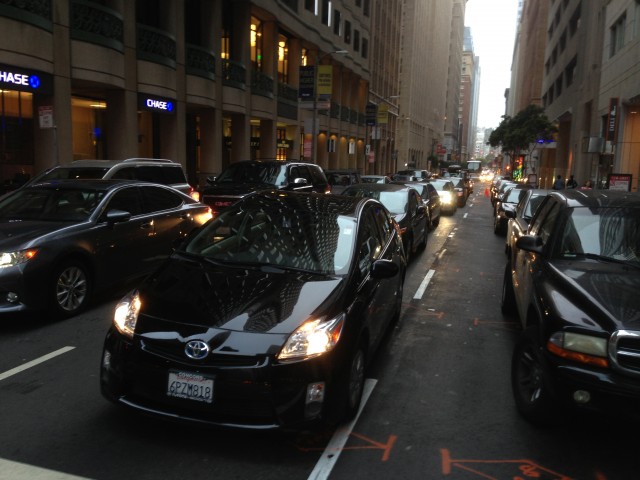L.A. slogged in at 36 percent — leading the pack in this country but well behind the world's three most congested cities: Rio de Janeiro (55 percent), Mexico City (54 percent) and Sao Paulo (46 percent). The upcoming World Cup might push Brazil's numbers into the stratosphere.
In the United States, Honolulu was third, followed by Seattle, San Jose, New York, Miami, Washington, D.C., Portland and New Orleans. Clearly, the West Coast — which occupies five of the top 10 spots — is not an easy place to get around. The least jammed city in the country was Kansas City, with only 9 percent congestion, followed closely by Indianapolis, Cleveland and Richmond, Virginia, which were all tied at 10 percent.
San Francisco, which moved up from third place in 2012, registered 48 percent congestion in the morning peak and 66 percent in evening rush hour. The single most congested day of the year was Nov. 22, 2013. Nobody knows why, although that day was the Friday before Thanksgiving week began, which is typically a chaotic period, with lots of comings and goings.
The spots with the worst congestion in the Bay Area, according to the report, include: 101/Bayshore Freeway between the I-280 interchange and downtown, Stockton and Montgomery streets downtown, Oak/Octavia/Central Freeway, 19th Avenue south of Sloat Boulevard, the Bay Bridge approaches in Oakland, and I-280/King Street/Embarcadero.
The best rush-hour commutes were Friday morning and Monday evening. The worst were Tuesday morning and Thursday night. In fact, the Thursday evening commute was the worst peak congestion in most U.S. cities, the study found.
The report is timely, especially in light of the three-day sickout by Muni operators earlier this week and a recent poll by the Bay Area Council, a business-sponsored public policy group, which found that more than 71 percent of respondents think traffic congestion in the region is a crisis.
KQED Forum guest Jim Wunderman, president and CEO of the Bay Area Council, said of the poll, "Of 1,000 Bay Area respondents, 77 percent normally drive alone, which is way, way too many."
Commuters around the world are spending an average of eight working days a year stuck in traffic. Ironically, shortcuts that drivers use to avoid congestion are adding 50 percent more travel time to trips, according to the Tom Tom Traffic Index.
"You need now to get to the Bay Bridge closer to 5:30 a.m. to get that trip you once got (just before 6 a.m.)," said another KQED Forum guest, Randy Rentschler, director of legislation and public affairs for the Metropolitan Transportation Commission.
In the United States, the report looked at 53 metropolitan areas with a population of more than 800,000. Of 63 cities in the Americas, San Francisco was sixth in traffic congestion.
One of the segments on KQED Forum Thursday explored the Tom Tom study and Bay Area traffic congestion. The show elicited more than 100 comments. And they were all over the map:
Transit bandwidth has not kept up with population growth, so stop building new roads. … People wouldn't need to drive from so far away if real estate speculators had not been allowed to destroy affordable housing. … Eisenhower subsized the trucking industry to build interstate highways. … Bike riders who hog a lane and refuse to move over are the problem. … And countering that: Overweight and out-of-shape Americans are the problem.
And this: "Ban rich people from living near and taking Google buses. If this does not solve the problem, prohibit rich people from working in SF."
